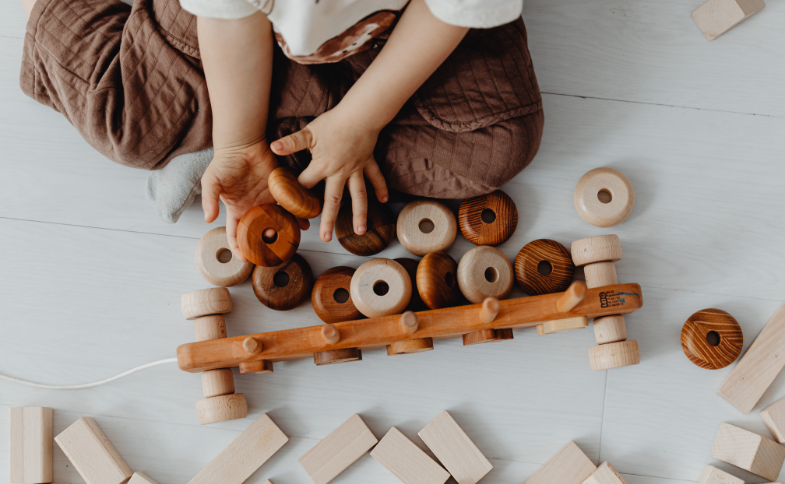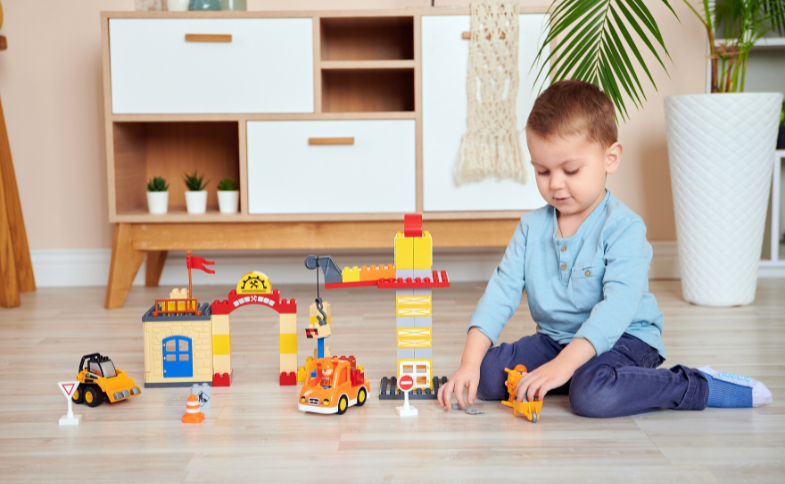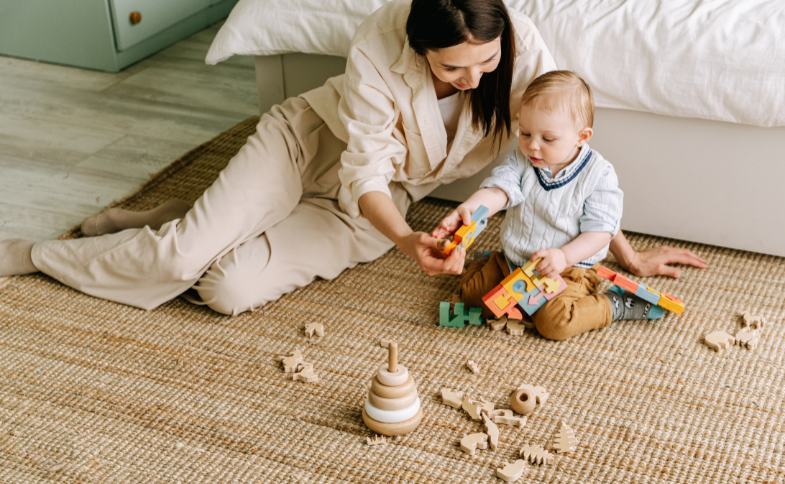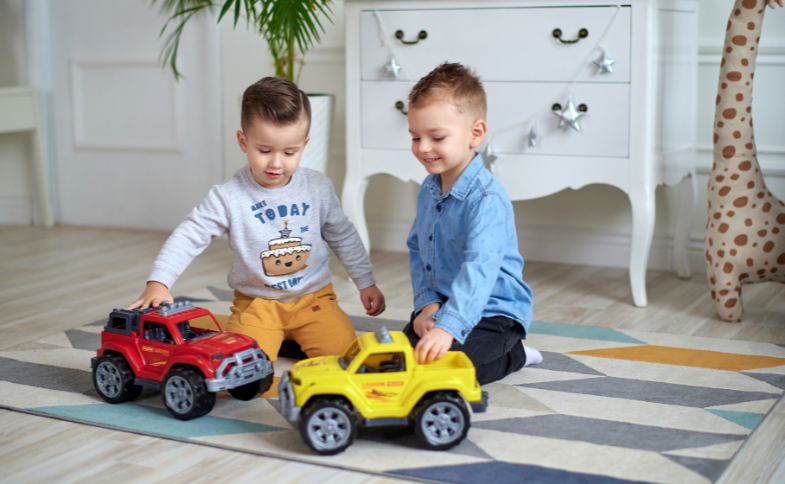The Best Educational Toys for Toddlers and Preschoolers (Perfect for Gift Giving!)
Choosing the right toys for toddlers and preschoolers can be a daunting task. With so many options available, it's easy to feel overwhelmed. But don't worry, we're here to help!
In this guide, we'll explore some of the best educational toys for young children that are both fun and beneficial for their development. These toys make perfect gifts for birthdays, holidays, or any special occasion.

Why Educational Toys Matter
Educational toys are more than just toys. They are tools for shaping your child's early development. These toys offer a multitude of benefits, fostering cognitive, physical, social, and emotional growth in young learners.
Here is how they accomplish this:
- Cognitive Development:
- Problem-Solving Skills: Puzzles, building blocks, and shape sorters challenge children to think critically and strategically.
- Spatial Reasoning: Construction toys and puzzles help children understand spatial relationships and develop mental rotation skills.
- Early Mathematical Thinking: Number puzzles, counting toys, and simple board games introduce basic mathematical concepts.
- Motor Skills Development:
- Fine Motor Skills: Activities like stacking blocks, threading beads, and using art supplies refine the small muscles in the hands and fingers.
- Gross Motor Skills: Toys that encourage movement, such as balls, ride-on toys, and climbing structures, help children develop large muscle groups and improve balance and coordination.
- Creativity and Imagination:
- Open-Ended Play: Toys like art supplies, play kitchens, and dress-up clothes provide endless possibilities for imaginative play.
- Divergent Thinking: Open-ended toys encourage children to think outside the box and come up with multiple solutions to problems.
- Language and Communication Skills:
- Vocabulary Expansion: Storytelling, singing songs, and engaging in interactive play with toys can introduce children to new words and concepts.
- Communication Skills: Playing with others encourages children to communicate their thoughts and feelings, negotiate, and cooperate.
- Social and Emotional Development:
- Social Skills: Playing with others fosters important social skills like sharing, taking turns, cooperating, and resolving conflicts.
- Emotional Regulation: Toys can help children learn to identify and express their emotions in healthy ways.

The Long-Term Benefits:
The benefits of educational toys extend far beyond early childhood. Research has shown that children who engage in play with educational toys are more likely to:
- Perform well in school
- Develop strong problem-solving skills
- Be creative and innovative
- Have good social and emotional skills
Top Picks for Toddlers (Ages 1-3)
- Stacking and Nesting Toys: These classic toys help develop hand-eye coordination, spatial reasoning, and problem-solving skills. Look for colorful sets with different shapes and sizes.
- Shape Sorters: These toys introduce basic shapes and colors while promoting problem-solving and fine motor skills. Choose ones with engaging designs and sounds.
- Activity Tables: These multi-functional toys offer a variety of activities, such as music, lights, and manipulative elements, to keep little ones entertained and engaged.
- Push and Pull Toys: These toys encourage gross motor development and exploration as toddlers learn to walk and move around.
- Soft Blocks: These safe and colorful blocks are perfect for stacking, building, and knocking down. They also help develop sensory awareness and creativity.
Top Picks for Preschoolers (Ages 3-5)
- Building Blocks: These versatile toys encourage creativity, problem-solving, and spatial reasoning. Look for sets with different shapes, sizes, and colors.
- Puzzles: Puzzles help develop problem-solving skills, patience, and perseverance. Choose puzzles with age-appropriate themes and images.
- Art Supplies: Crayons, markers, paint, and play dough provide endless opportunities for creative expression and fine motor development.
- Pretend Play Sets: Play kitchens, tool sets, and doctor kits encourage imaginative play and social-emotional development.
- Board Games: Simple board games introduce basic concepts like counting, taking turns, and following rules. They also promote social interaction and cooperation.

Tips for Choosing Educational Toys
Choosing the right educational toys can significantly impact a child's development and learning journey. Here's an expanded guide to help you make informed decisions:
1. Age and Stage Appropriateness:
- Consider Developmental Milestones: Select toys that align with the child's current developmental stage.
- Age Recommendations: Pay attention to age recommendations provided by manufacturers. These are often based on safety concerns and the complexity of the toy.
- Individual Differences: Remember that every child develops at their own pace. Observe your child's interests and abilities to choose toys that are a good fit.
2. Open-Ended Play:
- Encourage Creativity: Choose toys that spark imagination and allow for multiple ways to play. Building blocks, art supplies, and pretend play sets are great examples.
- Avoid “One-Trick Ponies”: Toys with limited play options can quickly become boring. Look for toys that offer versatility and encourage exploration.
3. Safety and Durability:
- Non-Toxic Materials: Ensure toys are made from safe, non-toxic materials, especially for young children who tend to put things in their mouths.
- Sturdy Construction: Choose toys that can withstand active play and won't break easily.
- Age-Appropriate Safety Features: Consider features like small parts warnings and choking hazards for younger children.
4. Child's Choice:
- Involve the Child: Whenever possible, let the child participate in the selection process. This helps ensure the toy is something they're genuinely interested in.
- Observe Their Play: Pay attention to the types of toys your child naturally gravitates towards. This can provide clues about their interests and learning styles.
- Respect Their Preferences: While you want to guide their choices, allowing them some autonomy can foster a sense of ownership and engagement.

Budget-Friendly Educational Toys
Engaging educational toys don't have to break the bank. With a little creativity, you can find plenty of budget-friendly options that will spark your child's imagination and promote learning. Here are a few ideas:
- DIY sensory bins: Sensory bins are a great way to encourage exploration and discovery. You can easily create your own by filling a container with materials like rice, beans, sand, water, or even shaving cream. Add some scoops, cups, and other objects for your child to manipulate, and let them explore to their heart's content.
- Homemade puzzles: Puzzles are a classic educational toy that can help children develop problem-solving skills and hand-eye coordination. You can make your own puzzles by cutting up pictures from magazines or old calendars, or by drawing your own designs on cardboard.
- Repurposed household items for creative play: Many everyday household items can be repurposed into fun and educational toys. For example, empty cardboard boxes can become forts, castles, or spaceships. Old clothes and fabric scraps can be used for dress-up or for making puppets. And kitchen utensils can be used for musical instruments or for pretend cooking.
Additional Tips for Choosing Toys:
- Consider Your Child's Age and Developmental Stage: Choose toys that are appropriate for your child's age and developmental level. Toys that are too simple or too complex can be frustrating and may not hold their interest.
- Focus on Quality Over Quantity: It's better to have a few high-quality toys that your child loves than a large collection of toys that they quickly tire of.
- Choose Open-Ended Toys: Open-ended toys can be used in a variety of ways, encouraging creativity and imagination.
- Encourage Active Play: Look for toys that encourage physical activity and movement.
- Limit Screen Time: While some educational apps and games can be beneficial, it's important to limit screen time and encourage more hands-on play.
- Cultural Relevance: Choose toys that reflect your child's cultural background and experiences.
- Sustainability: Consider toys made from eco-friendly materials or those that promote environmental awareness.
- Multi-Child Households: If you have multiple children, look for toys that can be enjoyed by different age groups or that encourage cooperative play.

Further Reading
Discover more insights on child development and play from New Mommy Media:
- How to Stimulate Your Baby's Brain Development
- DIY Sensory Play for Babies and Toddlers
- How to Encourage Your Toddler to Read
- The Benefits of Reading to Your Baby or Toddler
- How to Organize a Playdate
These articles provide additional guidance to support your child's learning and development through play and interaction.
Final Thoughts
Educational toys are more than just gifts. They're investments in your child's future. Choose wisely, play together, and watch your little one grow! However, you need to remember that every child is unique. What works for one might not work for another. Always supervise playtime and choose toys that match your child's individual interests and developmental stage. Good luck!